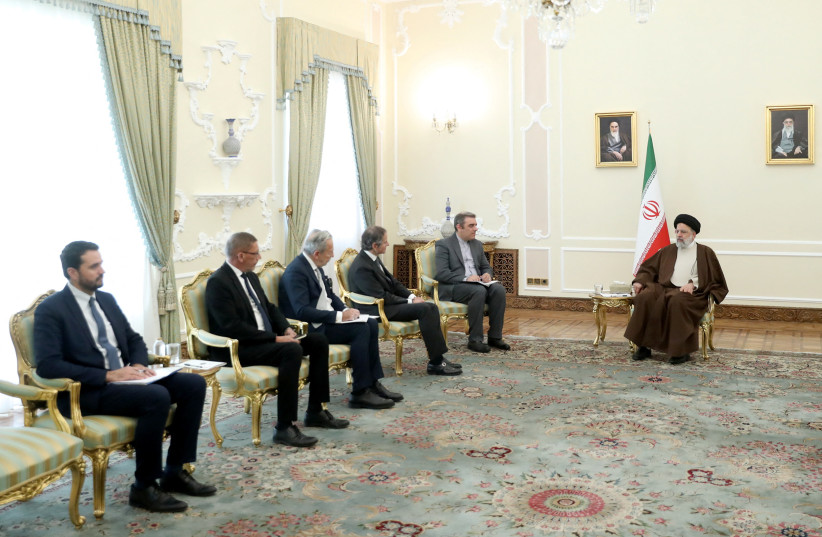Netanyahu: Why can Iran try to slaughter us but we can't defend ourselves?

"Are we forbidden from defending ourselves? We are obviously permitted to do this," Prime Minister Benjamin Netanyahu told his cabinet in a televised speech Saturday night.
Prime Minister Benjamin Netanyahu rebuffed as "unworthy" comments by the UN nuclear watchdog chief that any Israeli or US attack on Iran's nuclear facilities would be illegal as he insisted that Israel had a right to defend itself.
Having visited Tehran in a bid to loosen deadlocked talks on renewing its 2015 nuclear deal with world powers, International Atomic Energy Agency chairman Raphael Grossi on Saturday said "any military attack on nuclear facilities is outlawed."
He was responding to a reporter's question about threats by Israel and the United States to attack Iran's nuclear facilities if they deem diplomacy meant to deny it the bomb to be at a dead end. Tehran says its nuclear program is peaceful.
"Rafael Grossi is a worthy person who made an unworthy remark," Israeli Prime Minister Benjamin Netanyahu told the government before its weekly meeting on Sunday.
How is it possible, he wanted to know, that the IAEA’s concern is that an Israeli attack might be illegal?
“Outside of what law?” Netanyahu asked.
“Is it permissible for Iran that openly calls for our destruction to defend the instruments of destruction that will slaughter us? Are we not allowed to defend ourselves? Of course, we are allowed, and of course, we do it.
“And we do it through discussions or actions that occur around the clock which of course I will not detail here.
“I say this because nothing will prevent us from defending this state, and preventing the oppressors from eliminating the Jewish state,” Netanyahu said.
He reflected on the link between Iran’s threats against Iran, from what is modern-day Persia, and the Purim holiday Jews celebrate this week marking their escape from destruction in ancient Persia.
“We are on the eve of the Purim holiday, when 2,500 years ago there arose a thug in Persia (modern-day Iran) who wanted to destroy the Jews. They didn't succeed then, they won't succeed today either,” he said.
Israel, IAEA standoff amid Iranian nuclear enrichment
The diplomatic standoff between Israel and the IAEA broke out just one day before the watchdog agency’s 35-member board was set to meet Monday to debate reports that Iran had enriched uranium at 84%, close to the 90% needed for weapons-grade.
Grossi while in Iran over the weekend secured an agreement by which Tehran agreed to allow the IAEA to resume of its monitoring activity, a move that is likely to stave off any IAEA action at its board meeting.
Netanyahu has pushed for IAEA board members and European countries to take a harsher stand against Iran and has insisted that only a credible military threat would thwart its program.
In Jerusalem on Sunday Netanyahu met with Slovakian Prime Minister Eduard Heger and emphasized the need to prevent Iran from obtaining nuclear weapons, according to the Prime Minister’s Office in Jerusalem.
But Israel’s primary focus has been the United States and its regional allies, where it has sought to create a united front against Iran.
Israel’s National Security Adviser Tzachi Hanegbi and its Strategic Adviser Ron Dermer are in Washington to discuss Iran with the Biden administration. It followed a visit to Israel over the weekend by US. Chairman of the Joint Chiefs of Staff, General Mark Milley and in advance of a visit to Israel by US Defense Secretary Lloyd Austin who arrived in Jordan on Sunday.
His Middle East tour will also take him to Israel and Egypt in a show of support for its main regional allies against the growing threat posed by Iran, US officials said.
Austin wrote on Twitter before his departure that he would meet key leaders and "reaffirm the US commitment to regional stability and advancing the shared interests of our allies and partners."
The US Defense Department said ahead of the visit that discussions would focus on the growing threat Iran poses to regional stability, and on advancing multilateral security cooperation with integrated air and missile defenses.
Central to the discussion will be the "full constellation of Iran-associated threats..." a senior defense official was quoted as saying on the Pentagon's official site ahead of the visit.
"Those threats include Iran's arming, training and funding of violent proxy groups, aggression at sea, cyber threats, its ballistic missile program and drone attacks," he added.
In Israel, Austin will also raise his concerns about a surge in violence in the West Bank that has alarmed Jordan and Arab leaders and discuss diplomatic efforts to reduce tensions ahead of Muslim and Jewish religious holidays, US officials said.
Jerusalem Post Store
`; document.getElementById("linkPremium").innerHTML = cont; var divWithLink = document.getElementById("premium-link"); if (divWithLink !== null && divWithLink !== 'undefined') { divWithLink.style.border = "solid 1px #cb0f3e"; divWithLink.style.textAlign = "center"; divWithLink.style.marginBottom = "15px"; divWithLink.style.marginTop = "15px"; divWithLink.style.width = "100%"; divWithLink.style.backgroundColor = "#122952"; divWithLink.style.color = "#ffffff"; divWithLink.style.lineHeight = "1.5"; } } (function (v, i) { });

